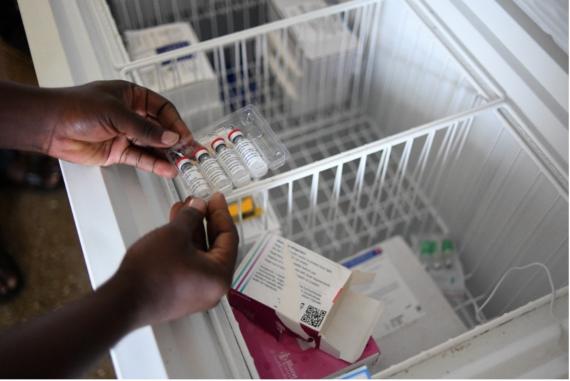…as N/R Health Directorate appeals for funds to acquire plants
The Northern Regional Health Directorate is in dire need of funds to acquire transformers and plants to enhance the supply of efficient power to various cold rooms at the regional stores for standard temperature storage of COVID-19 vaccines and other essential drugs.
The directorate currently needs GH¢250,000 for these installations to preserve the drugs which are distributed to various health facilities to engage in vaccination exercises aimed protecting the lives of citizens against diseases.
The directorate currently has a small generator as a back-up for electricity, which is not enough to provide the needed and stabilised power to run the fridges in the various cold rooms effectively.
The Northern Regional Director of Health, Dr. Braimah Baba Abubakari, disclosed this when a team from the Japan Embassy in collaboration with the United Nation’s International Children Educational Fund (UNICEF) paid a working visit to assess the impact of the Japan/UNICEF funded projects in the metropolis.
He noted that with the support of the Japan International Cooperation Agency (JICA), the directorate has the requisite fridges to store enough vaccines and drugs, but unstable power supply continues to be a challenge.
According to Dr. Abubakari, the stand-by generator consumes about GH¢5,000 worth of fuel per week to keep it running, which is affecting the coffers of the directorate. “There is high demand for the vaccines but the fear of management is the power supply to keep the drugs in their efficient state. The provision of the cold store freezer has helped to store enough vaccines and drugs,” he said.
He, therefore, appealed for support to procure the needed equipment to ensure an efficient power supply.
Chief Field Officer at UNICEF Bhanu Pathak acknowledged that the importance of effective management of vaccines, citing that some investments have been channelled to that effect by entities, including the Japan Government. “The critical gap during the vaccine deployment were inadequate cold chain equipment, logistics and capacity of technical staff to support effective management and deployment of the increasing quantity of vaccines to roll out the subsequent phases of the National Vaccination Deployment Plan and scale up to all the regions,” he said.
He added that since the vaccines required ultra-cold chain storage, COVAX/VAX supported Ghana with cold chain equipment to close the storage gap, but that was still not enough.
The Government of Japan, he further noted, supported the Government of Ghana with an amount of US$925,925 to procure additional equipment and build the capacity of staff to monitor and ensure a smooth roll-out of the vaccination exercise.
The Japan Team Lead, Sonada Shohei, commended the Regional Health Directorate and the UNICEF for commending Japan’s effort to strengthen Ghana’s healthcare services, and reiterated the Japan Government’s commitment to long-term partnership for the development of Ghana. “Japan aims to help strengthen Africa’s health sector in various forms in order to achieve the goal of universal health coverage,” Mr. Shohei added.










